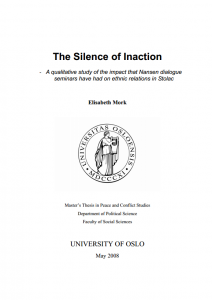 The primary aim of this thesis is to investigate if the dialogue seminars organised by the Nansen Dialogue Centre (NDC) in Mostar have had a perceptible impact on ethnic relations locally in Stolac, at the level of practices and/or representations – and if so, in which ways. The main method used for generating empirical data was qualitative analysis of interviews with four teachers who work at the ethnically segregated Stolac High School. The empirical data from the interviews with the teachers were compared with data from interviews with two participants from Srebenica. The findings indicate that the dialogue seminars have created a limited sphere for inter-ethnic interaction for the teachers in Stolac. In the seminars they were able to share common goals and needs, and work on joint problems regarding Stolac High School. However, the seminars do not seem to have had a significant impact at the level of practices. There is a relative absence of newly initiated inter-ethnic social relationships involving the participants from Stolac taking part in the dialogue seminars. The teachers have not had much further contact with one another without help from the NDC, even though they all argue that this contact is highly appreciated and needed. Some interpretations for the teachers’ apparent reluctance to initiate contact with “the other” participants are addressed in this thesis.
The primary aim of this thesis is to investigate if the dialogue seminars organised by the Nansen Dialogue Centre (NDC) in Mostar have had a perceptible impact on ethnic relations locally in Stolac, at the level of practices and/or representations – and if so, in which ways. The main method used for generating empirical data was qualitative analysis of interviews with four teachers who work at the ethnically segregated Stolac High School. The empirical data from the interviews with the teachers were compared with data from interviews with two participants from Srebenica. The findings indicate that the dialogue seminars have created a limited sphere for inter-ethnic interaction for the teachers in Stolac. In the seminars they were able to share common goals and needs, and work on joint problems regarding Stolac High School. However, the seminars do not seem to have had a significant impact at the level of practices. There is a relative absence of newly initiated inter-ethnic social relationships involving the participants from Stolac taking part in the dialogue seminars. The teachers have not had much further contact with one another without help from the NDC, even though they all argue that this contact is highly appreciated and needed. Some interpretations for the teachers’ apparent reluctance to initiate contact with “the other” participants are addressed in this thesis.
Masters thesis by Elisabeth Mork
97 pages
University of Oslo (2008)
Available through UiO Duo Vitenarkiv